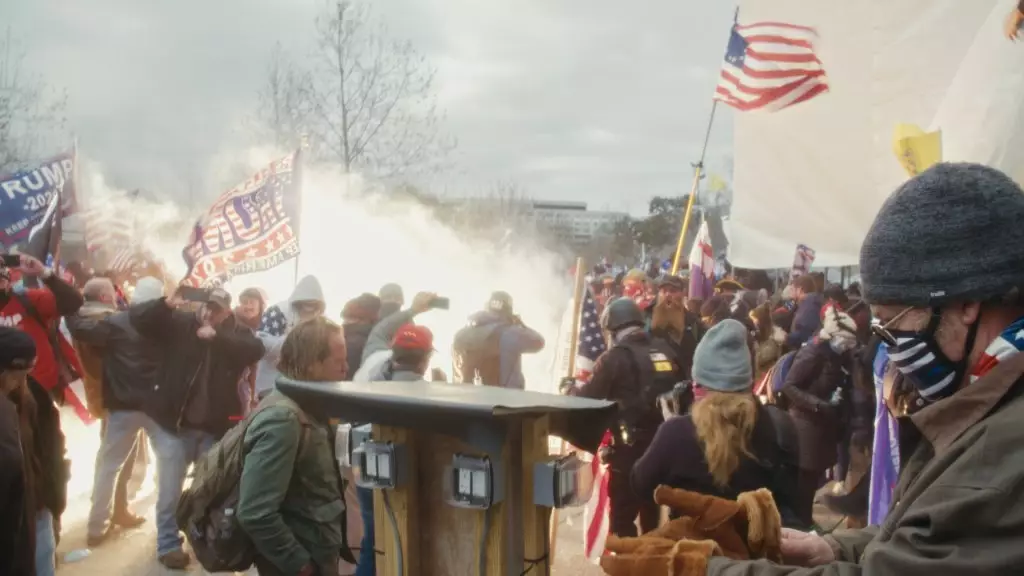The documentary “Fight Like Hell,” directed by Jon Long, presents an unprecedented visual account of the January 6 riots at the United States Capitol. Scheduled to premiere on September 24 via YouTube, this feature-length film utilizes high-definition RED camera technology to provide an immersive look into one of the most contentious days in American history. The film serves dual purposes: it chronicles the harrowing events that took place that fateful day while also exploring the complex web of narratives leading up to the Capitol’s storming.
At its core, “Fight Like Hell” addresses the insurrection within a broader context by investigating the origins of the “Stop the Steal” movement. This grassroots campaign asserted unfounded claims of electoral fraud following the 2020 presidential election. Notably, the documentary avoids partisan commentary, choosing instead to allow viewers to witness the unfolding tension and chaos from a neutral perspective. This approach invites audiences to engage with the subject matter without the biases of traditional media narratives.
Another compelling aspect of “Fight Like Hell” is its examination of pivotal figures connected to both the “Stop the Steal” movement and subsequent legal ramifications. Among the personalities spotlighted in the documentary are Roger Stone, Steve Bannon, Rudy Giuliani, and Ret. Lt. Gen. Michael Flynn. Each played significant roles in shaping the narrative that fueled the events leading to January 6.
Stone, who has been a political provocateur since the dawn of the Trump era, is depicted as an architect of the movement that would ultimately culminate in violence. Bannon, infamous for his strategic maneuvers during Trump’s campaign, also features prominently in the narrative. As one observes their actions leading up to the insurrection, it becomes increasingly clear how intertwined personal ambition and collective unrest can potentially destabilize a nation.
Giuliani’s efforts as a leading legal voice in Trump’s attempt to overturn the election results also come under scrutiny, sparking discussions about the ethical implications of legal advocacy in the face of falsehoods. Meanwhile, Flynn’s controversial positions and prior convictions raise questions about the accountability of former officials in a democratic society. The documentary emphasizes that these individuals did not merely represent themselves but stood as part of a larger, complex apparatus of dissent against an election perceived by some as illegitimate.
In his director’s statement, Jon Long articulates the uncertainty surrounding the January 6 narrative, which remains clouded by division and disinformation even three years later. He acknowledges the challenge of navigating these turbulent waters, particularly as many individuals remain entrenched in ideological echo chambers.
Long’s commitment to producing an independent documentary underscores the pressing need for authentic dialogue in a society rife with suspicion and misinformation. He emphasizes a deliberate departure from sensationalism and political bias, aiming to capture the raw essence of what transpired. This film seeks to foster open-mindedness and critical reflection—an opportunity for viewers to confront the fragility of democracy and their collective responsibilities in preserving it.
The title of the documentary—borrowed from then-President Trump’s rallying cry on January 6—serves as a powerful reminder of how words can galvanize masses and lead to radical action. Each utterance has the potential to inspire, but it can also lead to chaos, challenging viewers to contemplate the implications of political rhetoric in an evolving American landscape.
Concluding Thoughts: The Significance of “Fight Like Hell”
“Fight Like Hell” represents not merely a retelling of violent events but also a profound exploration of the ideological fault lines that continue to divide the nation. Its unique narrative approach urges viewers to consider their roles in the political discourse and reflect on the consequences of their beliefs and actions. As America navigates an ever-evolving dialogue about democracy, this documentary stands as a critical entry point for understanding the complexities surrounding January 6—one that will likely shape historical discourse for generations to come.


Leave a Reply